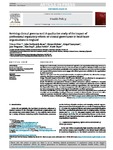Reviving clinical governance? A qualitative study of the impact of professional regulatory reform on clinical governance in healthcare organisations in England

Date
2020-04Author
Subject
Metadata
Show full item recordAbstract
BACKGROUND: Until recently, processes of professional regulation and organisational clinical governance in the UK have been largely separate. However, the introduction of medical revalidation in 2012 means that all doctors have to demonstrate periodically to the regulator that they are up to date and fit to practise, and as part of this process doctors must engage with clinical governance activities in the organisations in which they work. OBJECTIVE: To explore how the recent implementation of medical revalidation has affected the arrangements for clinical governance in healthcare organisations in England. DESIGN: Thematic analysis of interviews with 62 senior clinicians and non-clinicians in management or senior administrative roles, from a range of healthcare organisations in England. RESULTS: Revalidation has engendered changes to clinical governance systems, resulting in: increased doctor engagement with clinical governance activities; new or improved systems for access to clinical governance data for doctors and leaders within healthcare organisations; and more leverage - through the Responsible Officer role - to enforce engagement with clinical governance. Organisational context has been an important mediator of the impact of revalidation on clinical governance. CONCLUSION: Revalidation has increased alignment between systems for organisational and professional oversight and accountability, resulting in increased scrutiny of clinical practice. However, it is still a matter of conjecture whether this will in turn lead to improvements in medical performance.
Description
Collections
Publisher
Place of Publication
Journal
Volume
Issue
Pagination
Author URL
Recommended, similar items
The following license files are associated with this item:

